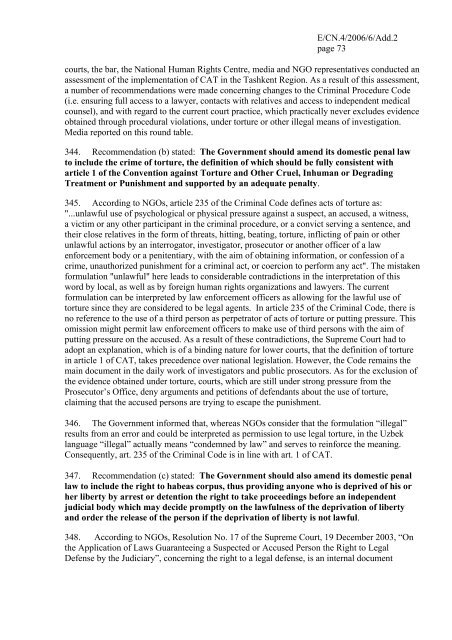E Economic and Social Council - acnudh
E Economic and Social Council - acnudh
E Economic and Social Council - acnudh
Create successful ePaper yourself
Turn your PDF publications into a flip-book with our unique Google optimized e-Paper software.
E/CN.4/2006/6/Add.2<br />
page 73<br />
courts, the bar, the National Human Rights Centre, media <strong>and</strong> NGO representatives conducted an<br />
assessment of the implementation of CAT in the Tashkent Region. As a result of this assessment,<br />
a number of recommendations were made concerning changes to the Criminal Procedure Code<br />
(i.e. ensuring full access to a lawyer, contacts with relatives <strong>and</strong> access to independent medical<br />
counsel), <strong>and</strong> with regard to the current court practice, which practically never excludes evidence<br />
obtained through procedural violations, under torture or other illegal means of investigation.<br />
Media reported on this round table.<br />
344. Recommendation (b) stated: The Government should amend its domestic penal law<br />
to include the crime of torture, the definition of which should be fully consistent with<br />
article 1 of the Convention against Torture <strong>and</strong> Other Cruel, Inhuman or Degrading<br />
Treatment or Punishment <strong>and</strong> supported by an adequate penalty.<br />
345. According to NGOs, article 235 of the Criminal Code defines acts of torture as:<br />
"...unlawful use of psychological or physical pressure against a suspect, an accused, a witness,<br />
a victim or any other participant in the criminal procedure, or a convict serving a sentence, <strong>and</strong><br />
their close relatives in the form of threats, hitting, beating, torture, inflicting of pain or other<br />
unlawful actions by an interrogator, investigator, prosecutor or another officer of a law<br />
enforcement body or a penitentiary, with the aim of obtaining information, or confession of a<br />
crime, unauthorized punishment for a criminal act, or coercion to perform any act". The mistaken<br />
formulation "unlawful" here leads to considerable contradictions in the interpretation of this<br />
word by local, as well as by foreign human rights organizations <strong>and</strong> lawyers. The current<br />
formulation can be interpreted by law enforcement officers as allowing for the lawful use of<br />
torture since they are considered to be legal agents. In article 235 of the Criminal Code, there is<br />
no reference to the use of a third person as perpetrator of acts of torture or putting pressure. This<br />
omission might permit law enforcement officers to make use of third persons with the aim of<br />
putting pressure on the accused. As a result of these contradictions, the Supreme Court had to<br />
adopt an explanation, which is of a binding nature for lower courts, that the definition of torture<br />
in article 1 of CAT, takes precedence over national legislation. However, the Code remains the<br />
main document in the daily work of investigators <strong>and</strong> public prosecutors. As for the exclusion of<br />
the evidence obtained under torture, courts, which are still under strong pressure from the<br />
Prosecutor’s Office, deny arguments <strong>and</strong> petitions of defendants about the use of torture,<br />
claiming that the accused persons are trying to escape the punishment.<br />
346. The Government informed that, whereas NGOs consider that the formulation “illegal”<br />
results from an error <strong>and</strong> could be interpreted as permission to use legal torture, in the Uzbek<br />
language “illegal” actually means “condemned by law” <strong>and</strong> serves to reinforce the meaning.<br />
Consequently, art. 235 of the Criminal Code is in line with art. 1 of CAT.<br />
347. Recommendation (c) stated: The Government should also amend its domestic penal<br />
law to include the right to habeas corpus, thus providing anyone who is deprived of his or<br />
her liberty by arrest or detention the right to take proceedings before an independent<br />
judicial body which may decide promptly on the lawfulness of the deprivation of liberty<br />
<strong>and</strong> order the release of the person if the deprivation of liberty is not lawful.<br />
348. According to NGOs, Resolution No. 17 of the Supreme Court, 19 December 2003, “On<br />
the Application of Laws Guaranteeing a Suspected or Accused Person the Right to Legal<br />
Defense by the Judiciary”, concerning the right to a legal defense, is an internal document
















